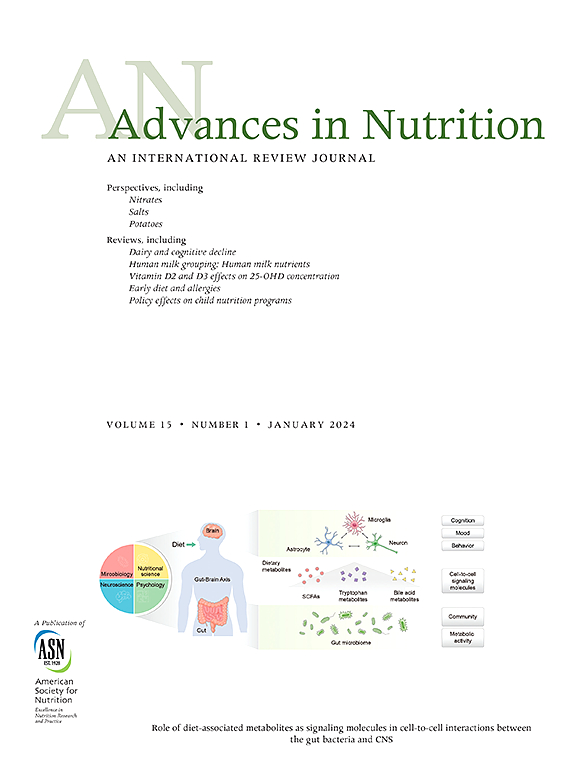追踪锌在早产儿健康中的作用:一个叙述性的回顾。
IF 9.2
1区 医学
Q1 NUTRITION & DIETETICS
引用次数: 0
摘要
锌(Zn)是一种微量元素,参与许多生理过程,包括酶功能、基因转录和细胞信号传导。它的重要性在早产儿中尤其明显,早产儿由于胎盘转移中断、高营养需求和医学并发症而处于缺锌的高风险中。在这一人群中,锌缺乏的固有风险因饮食中锌摄入不足而进一步增加。来自早产儿母亲的母乳含有低浓度的锌,尽管它具有很高的生物利用度。此外,从初乳(产后最初几天)到成熟乳(产后10-14天),锌含量稳步下降。配方奶含有较高的锌浓度,以弥补生产和储存过程中的营养损失。与人奶相比,配方奶的生物利用度较低,在植酸盐含量较高的情况下,如豆奶配方奶,生物利用度会进一步降低。锌补充剂在满足早产儿的需要方面可能是有用的,尽管在多营养素补充剂中有必要注意与其他营养素的潜在相互作用。由于缺乏可靠的锌状态生物标志物,需要高怀疑指数,因此锌缺乏症的早期检测具有挑战性。锌缺乏症的临床症状可以从轻微的非特异性症状到严重的多系统累及。长期缺乏可能导致无法茁壮成长。补充锌可以支持早产儿的生长并减轻合并症,尽管不同研究的差异使确定最佳剂量、确定安全性和长期影响的努力复杂化。虽然罕见,锌中毒在早产儿不应被忽视,特别是在婴儿长期肠外营养。这篇叙述性综述旨在巩固现有知识并确定研究空白,强调锌在支持早产儿健康方面的关键作用。需要进一步的研究来建立基于证据的做法,以改善这一弱势群体的健康结果。本文章由计算机程序翻译,如有差异,请以英文原文为准。
Tracing Zinc’s Role in Preterm Infants’ Health: A Narrative Review
Zinc (Zn) is a trace element involved in numerous physiological processes, including enzyme function, gene transcription, and cell signaling. Its importance is especially pronounced in preterm infants, who are at high risk of Zn deficiency due to disrupted transplacental transfer, high nutrient demands, and medical complications. The inherent risk of Zn deficiency in this population is further increased by poor Zn dietary intake. Human milk from preterm mothers contains low concentrations of Zn, although it is highly bioavailable. Additionally, the Zn content steadily declines from colostrum (first few days postpartum) to mature milk (>10–14 d postpartum). Formula milk contains higher Zn concentrations to compensate for nutrient losses during production and storage, and lower bioavailability compared with human milk, which is further decreased in case of high phytate content, such as in soy milk-based formulas. Zn supplements may prove useful in meeting the preterm infant’s needs, although caution is warranted regarding potential interactions with other nutrients within multinutrient supplements. Early detection of Zn deficiency is challenging due to the lack of reliable Zn status biomarkers, necessitating a high index of suspicion. Clinical signs of Zn deficiency can range from mild, nonspecific symptoms to severe, multisystem involvement. Chronic deficiency may lead to failure to thrive. Zn supplementation can support growth and mitigate comorbidities in preterm infants, although variability across studies complicates efforts to establish optimal dosing, and define safety and long-term effects. Although rare, Zn toxicity in preterm infants should not be overlooked, especially in infants on long-term parenteral nutrition. This narrative review aimed to consolidate existing knowledge and identify research gaps, highlighting the critical role of Zn in supporting preterm infants’ health. Further research is needed to establish evidence-based practices to improve health outcomes in this vulnerable population.
求助全文
通过发布文献求助,成功后即可免费获取论文全文。
去求助
来源期刊

Advances in Nutrition
医学-营养学
CiteScore
17.40
自引率
2.20%
发文量
117
审稿时长
56 days
期刊介绍:
Advances in Nutrition (AN/Adv Nutr) publishes focused reviews on pivotal findings and recent research across all domains relevant to nutritional scientists and biomedical researchers. This encompasses nutrition-related research spanning biochemical, molecular, and genetic studies using experimental animal models, domestic animals, and human subjects. The journal also emphasizes clinical nutrition, epidemiology and public health, and nutrition education. Review articles concentrate on recent progress rather than broad historical developments.
In addition to review articles, AN includes Perspectives, Letters to the Editor, and supplements. Supplement proposals require pre-approval by the editor before submission. The journal features reports and position papers from the American Society for Nutrition, summaries of major government and foundation reports, and Nutrient Information briefs providing crucial details about dietary requirements, food sources, deficiencies, and other essential nutrient information. All submissions with scientific content undergo peer review by the Editors or their designees prior to acceptance for publication.
 求助内容:
求助内容: 应助结果提醒方式:
应助结果提醒方式:


